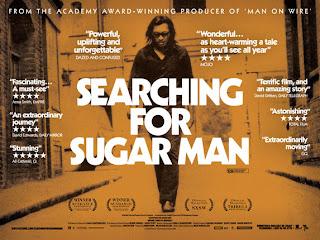Event - New Zealand
International Film Festival 2012
Venue - The Roxy Theatre, Wellington
Date – Monday 06th July 2012
Venue - The Roxy Theatre, Wellington
Date – Monday 06th July 2012
In
the unlikely event that you’ve not heard any of the wildly polarized critical
reactions of ‘Searching For Sugar Man’ - typically “an amazing story,
absolutely heart-warming” or “contrived to the point of annoyance” (I’m
paraphrasing but you get the jist), here’s the synopsis:
1970
– Sixto Rodriguez (known professionally simply as ‘Rodriguez’) signs to Sussex
Records (run by former Motown Records executive Clarence Avant)
and records his debut album, ‘Cold Fact’, produced by Dennis Coffey & Mike
Theodore to largely positive reviews The album, which consists of considered,
socially conscious soul-flecked folk, tanks commercially.
1973
– Based on a complete lack of any sort of commercial future, Sussex records
drops Rodriguez from its roster. He returns to labouring on demolition jobs and
drifts into obscurity.
Meanwhile
in South Africa, due to its strongly anti-establishment sentiments – the “Cold
Fact” LP becomes the soundtrack of the anti-apartheid movement. Again, quoting the
film, fan Stephen ‘Sugar’ Segerman (nicknamed because of the ‘Cold Fact’ leader
single, ‘Sugar Man’ from which the documentary takes its name), “If you went to
a white middle class liberal families house in the mid to late seventies and
there was a bunch of pop records; look and there would always be three records:
‘Abbey Road’ by The Beatles. ‘Bridge Over Troubled Water’ by Simon &
Garfunkel – and ‘Cold Fact’ by Rodriguez”.
In
the pre-internet isolation of apartheid-era South Africa, Rodriguez was a bona
fide star. The only problem was that, whilst his ‘Cold Fact’ album was reissued
on a couple of different labels – the cover had no information regarding who he
was. Several thousand miles away in Detroit, Rodriguez (who by this time was
working on the production line at the Chrysler factory) was unaware of his
newfound success and the mystique growing around his identity.
Several
urban myths developed around Rodriguez’s ultimate demise, (“he shot himself on
stage”, “he self-immolated on stage “ and, “he died of a heroin overdose in
prison” are three suggestions put forward here); the rumours continuing to grow
after the eventual release of the “Coming To Reality” LP (the South African
release titled as, ‘After The Fact’ with three bonus tracks, produced again by Dennis
Coffey & Mike Theodore, intended for inclusion on an aborted third album).
So,
fast forward to the nineties: apartheid has ended; it’s a new era of openness
and freedom and the internet has arrived. South African fans look to the USA to
find more about their hero and are dismayed to learn that, despite the fact
that he’s sold more records in South Africa than The Rolling Stones, Rodriguez
is not famous in the USA. More than that – no information about him is readily available
and Stephen Segerman sets up a website to try and find more information.
A Cape Town music journalist by the Craig
Bartholomew-Strydom, takes up the case and tries to find more about Rodriguez’s
real identity and how he died. ‘Searching For Sugarman’ is the story of that
search.
(It’s
one of those things that the less you know about the story, the better, so I
won’t ruin it here).
I
originally first heard about Rodriguez in ‘The MOJO Collection: The Greatest Albums Of All
Time’ book, later
reading a review of his newly reissued LP’s (on the increasing essential ‘Light
In The Attic’ label) in that same magazine and buying, “Coming From Reality” on
CD during my vinyl collecting hiatus.
Both
Rodriguez LP’s are fantastic and it’s a genuine shame that he wasn’t more
successful at the time.
Not
least a shame but a surprise. The seventies was the generation of the singer/songwriter and Rodriguez’s material
stands up well against other politically charged folkies of the era.
So
why wasn’t he successful?
Well,
potentially he was on the wrong label. Sussex is best known as a soul imprint
and this would make it confusing for pluggers to get into the right
DJ/Reviewers hands. (Judging by Clarence Avant’s response to being
asking where the royalties from the estimated 500,000 LP’s sold in South Africa
went, signing to Sussex might have also been a poor fiscal decision as well).
Using
Rodriguez as his stage name may well not have been the wisest choice. Was 1971
ready for the world’s first Mexican (by heritage) rock star? Did his name again
confuse the radio pluggers and ad-men into thinking that he was a latin
orientated act (which would have had a somewhat niche appeal during that era).
Was
it that his angsty material (which is pretty tame and accessible my modern
standards) was just too politically challenging for the contemporary audience?
Or
was it simply that he didn’t fit the cookie cutter mold of commercially
successful singer/songwriters of the era? He was from Detroit rather than
Laurel Canyon and his gritty approach reflected that. Urban rather than
pastoral, too soul for the folkies, too folky for the soul audience.
Whatever
it was, long overdue, the music world has at last realised their mistake and
made Rodriguez an artist with the esteem he deserves.
If you’ve not already – go and see this
documentary.


No comments:
Post a Comment